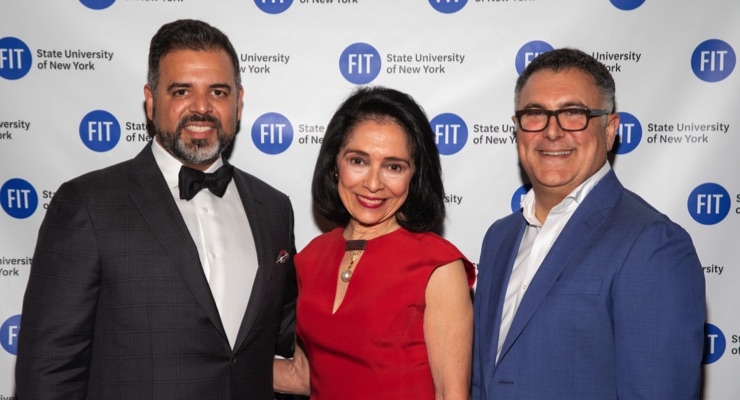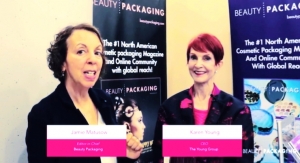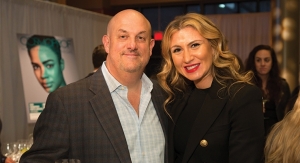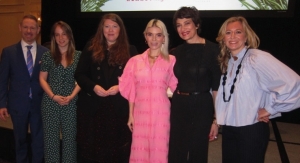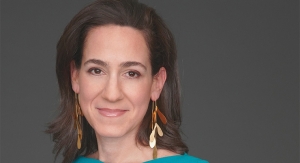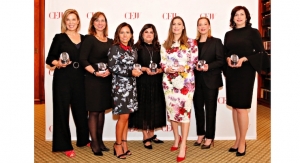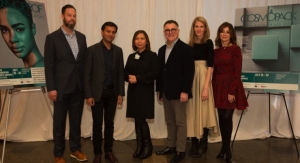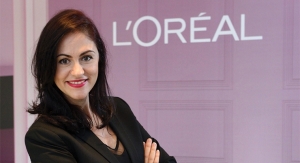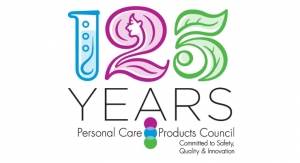Each year, the graduating class of the Cosmetics and Fragrance Marketing and Management (CFMM) Master’s degree program, at Fashion Institute of Technology (FIT), presents an in-depth analysis of a subject with relevance to both the beauty industry, and daily life at large.
This year, the students’ assignment focused on Beauty and Technology, and the ways in which technology is redefining the world around us as we enter the “Fifth Industrial Revolution.” As technology challenges our ways of doing business, and provides context for enriching and improving communication, personally and globally; it also blurs the lines between the physical and digital world, and, posits a redefinition of “what it means to be human.”
Pictured in the photo above: (L-R) Sean Mehta, president & CEO, Luminess; Dr. Joyce Brown, president, FIT; and Stephan Kanlian, chair & professor, Cosmetics and Fragrance Marketing and Management, FIT, at the 2019 Capstone Research event
FIT Grad Students Look at How Tech Can Transform Society
Held on June 12, 2019, at the Haft Theater, at FIT, the Capstone Research presentation examined such questions as the role of technology in enhancing data security, leveling the “great divide,” and ultimately, transforming society.
The CFMM Master’s degree program, part of the School of Graduate Studies at FIT, holds the distinction of being the only program of its kind that provides advanced education for emerging executives—and is thought to be a think tank of innovative leadership for the beauty industry. Stephan Kanlian, chair and professor, CFMM, welcomed all to the presentation, and introduced Wendy Liebmann, CEO, WSL Strategic Retail, vice chair, CFMM Industry Advisory Board, who acknowledged the “thinking and quality work that comes out of the CFMM program.” In her introduction of Dr. Joyce F. Brown, president, FIT, she thanked her for having the “prescience to introduce this program.”
Dr. Brown said, “The students that this program attracts are deeply interested not only in the program’s subject matter, but in the world at large.” She cited this year’s thesis, Beauty and Technology, and noted some of the numerous companies the students had visited to enhance their research, including L’Oréal, Rebecca Minkoff, and others; and thanked this year’s sponsor, Luminess, for its generous support. In her introduction of Sean Mehta, president, CEO, and founder, Luminess, she said, “Sean Mehta is one of those visionaries who understands the industry today.”
“FIT has become a second home to me and Luminess,” said Mehta. He congratulated the graduates and noted the huge changes taking place in the industry today; including a reference to how Luminess began selling airbrush cosmetics and today is a multi-channel cosmetic company selling skincare, makeup and more. He noted that Luminess started a program where the company takes care of their employees’ children’s college education, and urged industry leaders to “show we are an industry that watches over and takes care of our children.”
Capstone Presentations
Professor Kanlian provided background to the presentation, saying, “Today’s program is about the future of technology.” He described how he and Dr. Brooke Carlson took the students to Los Angeles to study how technology is currently at work in the industry and noted, “Most of what the research shows is new, a bit shocking, and actionable in our beauty industry. It was the most difficult research undertaking we have done.”
Part One focused on Technology and Societal Evolution
The Technology and Societal Evolution team was led by Lola Cooper, senior marketing manager, Philosophy, Coty Luxury Division; and Ewa Garbos, director of trade development and communications, Beauty Prestige Group, Shiseido Americas. Evelyn Gajc, director of national accounts, Lancome at L’Oréal USA, was the research lead.
Creative team members were: Kelly-May Cavalier, director of customer marketing, L’Oréal Paris; Kaitlyn Flatley, group director, digital, Chanel; and John Grella, director of events and education, Shiseido Americas.
The White Paper Team was led by Jessica Vaccaro, marketing manager, Unilever; and team members, Laura Chen, marketing manager, Becca Cosmetics, The Estée Lauder Companies; and Brooke Messner-Sheldon, education manager, Parfums Christian Dior, LVMH.
The studies focused on the Fifth Industrial Revolution in the world today, including AI and digital advances, and found that technological achievements of today are a foreshadowing of what is to come. “We have our real selves and we have our virtual selves,” they said, “and we have already seen our virtual replication on social media.” They said that advancements in quantum mechanics will result in technological shifts on every societal level; and will contribute to solving some of the greatest challenges, including providing new frontiers in health care and environmental systems.
Further, they suggested that technology will clearly impact the beauty brands of today, acknowledging that, from the Industrial Revolution to the current transformation of industry, society has been transformed drastically, from blockchain to AI. It was noted that connected devices will more than double by the year 2040, and as the population grows, “technological singularity” will bring us into the Fifth Industrial Revolution.
They acknowledged the potential of technology to contribute to a redefinition of societal norms, resulting in a new class system, and a possible shift toward global welfare as the aging population becomes the largest demographic in the next 20 years. “Ten percent of the global GDP could be based on blockchain technology by the year 2025,” said the students, and blockchain, as the digital ledger underlying most currencies, could also be used to log information, monitor supply chains and share data, as well as source raw materials and more. They noted that, LVMH had announced their use of blockchain to verify the ingredient integrity of their entire supply chain.
To provide an example of technological power, the students said, “New quantum computers can read an entire library of data all at once and many organizations are already using this technology.” Further, they touched on technology’s social impact, asking if technology can ultimately help to avoid the great divide, impacting the haves and have nots, whose access to technology will be integral to success.
Also examined was the question of data privacy and the ability to create trust beyond a brand and its consumers; dynamic regulation, when top thought leaders set the pace; the need to get up to speed and develop blockchain as well as corporate transparency; and the need to mobilize the work force, by starting technology upskilling.
“We will need a cognition reset in order to create trust and inspire teamwork,” said the students, urging organizations to mobilize their teams for continuous learning. They posited that 40% of repetitive jobs could be displaced by automatons; and that humans, machines, and industries may all be merged into a blended state of existence, asking: “The signs of imminent change are flashing right before our eyes, but are we paying attention”?
Part 2 Looked at Technology & Human Identity
The second segment of the presentation focused on technology’s impact on human development.
Group leaders included Katie Berman, director of strategy and business development for the Active Cosmetics Division of L’Oréal USA; and Tracy Taylor, senior manager, Fine Fragrance, Firmenich. Rebecca Scher, marketing manager, Shiseido Americas, was the research lead.
The creative team consisted of Cristina Fernandez, marketing director, Shu Uemura; Taous Bellahsene, director of global marketing at Fresh, LVMH; and Ashley Tourso, global marketing director for essie, at L’Oréal.
The White Paper team was led by Sophie Gillio, senior account executive in the Specialty Business Unit, Mane; and included Kaitlyn Forester, manager, global marketing and strategic analysis, Le Labo Fragrances, The Estée Lauder Companies; and Ariana Parasco, marketing director, Garnier, L’Oréal USA.
The presentation focused on rapidly developing technology and digital connectivity, the introduction of technology in early childhood, and the potential transformation of the human species as new scientific and cultural advancements affect human capabilities, including intellectual range, DNA, and the wiring of our brains.
“Google is now our memory and computers are our mind,” they said; further asking, “Is DNA a matter of destiny?” They explained that human evolution is moving beyond the constraints of genetics.
“iGen is a generational experiment, which brings the power of technological convenience into our daily lives,” they said, adding, “With convenience, however, comes compromising of our data privacy; so, there is a conundrum of control. Our blind adoption of technology has introduced a new set of limitations for iGen.” As technology enters every facet of our personal and professional lives, the students acknowledged, “Our minds, hearts, and bodies; as well as our cognitive abilities, are being impacted.”
They delved into the impact of screen time on the developing brains of adolescents, the crossover to screen addiction, and the draw of digital devices, equating excessive use as akin to dopamine, which may be hijacking individuals’ psyches, deeming the process, “brain hacking.”
They said, “Technology affects our relationships with our self and others, creating our capacity for solitude.” In explaining that growing dependence on devices can affect both social and emotional competencies, they characterized Gen Z as the loneliest generation, despite their frequent communications via social devices.
In addressing beauty specifically, the students referenced the use of social representation, noting there are two versions of the self, a physical and a digital self; and they discussed how with DNA, individuals can now breed the traits they find most desirable, which impacts human appearance, and further contributes to the great divide. While they questioned whether DNA would be a matter of destiny, or the potential for human editing, they urged further exploration through mindfulness, imagining a future where humans thrive to be mindful. They concluded, “Let’s make technology work harder to preserve and strengthen what makes us human.”
Awards Ceremony
Dr. Brooke Carlson, professor, CFMM, FIT, presented the Outstanding Scholar Award and Scholarship Recognition honors to two winners, Katie Berman, director of strategy and business development, Active Cosmetics Division, L’Oréal USA; and Ewa Garbos, director of trade development and communications, Beauty Prestige Group, Shiseido Americas.
The Coty Award for Professional Excellence, was presented by Morgan Hagney (Class of 2017), chair, Cosmetics and Fragrance Alumni Association, and Jessica Bibby (Class of 2018), vice chair, Cosmetics and Fragrance Alumni Association, to Corey Moran, Head of Industry, Fashion and Luxury, Google (Class of 2015).
The Estée Lauder Companies Faculty Leadership Award was presented by Lisa Sequino, senior vice president/Global General Manager, Becca Cosmetics, The Estée Lauder Companies (Class of 2013), to Karen Young, adjunct instructor, CFMM, CEO, The Young Group, and former senior executive in marketing and product development at The Estée Lauder Companies and L’Oréal/Lancôme.
The L’Oréal Student Leadership Award was presented by David Greenberg, group president, North America, L’Oréal USA Professional Products Division, and Class of 2018 Student Leadership Award Recipient Jennifer Nuttall, director of global marketing, Revlon, to Tracy Taylor, senior manager, Consumer Insights, Fine Fragrance, Firmenich.
The Department Medal was presented by Mary Davis, dean, School of Graduate Studies, FIT, and Stephan Kanlian, chair and professor, CFMM, FIT to Katie Berman, director of strategy and business development, Active Cosmetics Division, L’Oréal USA.
Closing remarks were made by Dorene Kaplan, industry/project manager, CFMM, FIT (Class of 2005), who invited attendees to a reception hosted by Luminess in honor of the Class of 2019.

